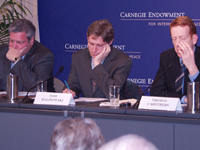Registration
Thank you!
You will receive an email confirming your registration.
The Obama administration must disassociate the United States from the damaging elements of the Bush legacy on democracy promotion without embracing an overly pessimistic view of democratic decline. The perception that the Bush administration pushed democracy too hard and a sobering global political landscape create pressure to pull back on democracy promotion. But it is crucial that the new administration not overreact to these pressures and step back too far just at the moment when President Obama’s election, which showcased American democracy at its most appealing, has captured the global imagination.
Carnegie’s Thomas Carothers discussed the challenges ahead for democracy promotion with Tom Malinowski of Human Rights Watch and Robert Kagan. With a new framework for democracy promotion that builds on President Obama’s bipartisan instincts and measured tone and acknowledges that democratic expansion is fundamentally in the U.S. interest, the new administration can return U.S. democracy promotion to a respected and productive footing.
Key points:
The Bush Legacy
- President Bush simultaneously elevated democracy promotion rhetorically and damaged its legitimacy, causing it to be seen as a cover for aggressive American unilateralism.
- The Bush administration in reality made only a modest push for democratic reform. The imperative of counterterrorism cooperation actually strengthened ties between the United States and autocrats in the Arab world, Pakistan, and elsewhere.
- The recurrent misconception that the United States places too much emphasis on elections –fueled by the media attention elections generate – does not accurately reflect the reality of U.S. democracy assistance.
The State of Democracy
- The Obama administration confronts a sobering landscape with almost no democratic momentum, in which democratic gains are likely to be very modest.
- The last decade has been one of democratic stagnation, not decline. The number of democracies has increased slightly, but the number of autocracies has dropped.
- Democracy support must be part of U.S. foreign policy because the United States is more comfortable, safer, and better off in a world populated by democracies than by dictatorships.
Obama’s Task
- Though the Obama administration, overloaded with a host of pressing domestic and international issues, has not yet defined itself on democracy promtion, the world will not wait long for it to do so. If the administration does not define itself soon, others will, reading the wrong things from U.S. silence on the topic.
- President Obama will have to repair the damage done by the Bush administration, disassociating democracy promotion with regime change and making clear that the United States is not violating the norms it promotes abroad.
- The new administration should not, however, embrace a broad realist corrective, but should focus on finding new ways to talk about democracy that draw naturally from President Obama’s political philosophy and style.
“Democracy intertwines in complex but inescapable ways with America's security, economic, socio-political, and moral interests,” Carothers concluded, and is simply too important to ignore.
